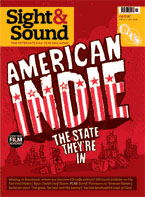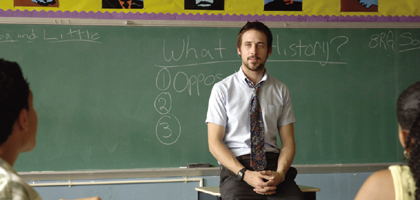Primary navigation


A new voice in American independent cinema, Ryan Fleck uses Half Nelson to probe the relationship between a stoned Brooklyn teacher, his drug dealer and his drug-running female pupil. Pay attention, says Ryan Gilbey
The self-consciously gritty spirit of US independent cinema, and the marshmallow softness of the inspirational issue movie, are fused to unusual effect in Half Nelson, the story of Dan Dunne, a Brooklyn teacher who puts the 'high' into junior high. The picture doesn't go so far as to suggest that Dan is a better teacher because he's a drug addict, though his hungry eyes and busy-bee mind remove for his students the option of zoning out. But when he is replaced late in the film by a supply teacher, who turns out to be a drone with an ingratiating habit of drawing a smiley face inside the dot above his 'i', we are asked to choose between two extremes of educator - one drab but clean, the other dynamic but stoned. The candidate who makes the most engaging movie protagonist is not the one we would choose in reality to educate our children, but then independent cinema, as much as musicals or science fiction, demands the suspension of a particular type of disbelief.
When Dan hits his stride in the classroom, Half Nelson pledges its allegiance to its thematic forebears: we could be watching To Sir, with Smack, or The Mainlining of Miss Jean Brodie. Boaz Yakin's uncompromising 1994 film Fresh, to which Half Nelson bears a passing resemblance, got by without any equivalent instances of emotional cheerleading. But it's hard to begrudge director Ryan Fleck (who co-wrote the screenplay with Anna Boden) these crowd-pleasing interludes. Dan tells his 13-year-old pupils that history is 'the study of change over time', marked by 'opposing forces' and 'turning points'. And what elevates this film immediately above its movie-of-the-week subject matter is the sobriety with which it handles its own tale of opposing forces, mostly without recourse to signposted turning points. Any 'change over time' here occurs at a faltering pace, or not at all.
The picture examines in part the moral tug-of-war between Dan, a white heroin addict, and Frank, a black drug dealer, over the welfare of 13-year-old African-American girl Drey. Both Dan and Frank have near-identical scenes in which they attempt to intervene in what they see as Drey's inappropriate relationship with the other. Drey's parents - her hard-working mother and absent, unreliable father - are kept out of this loop, but there's no sense that Drey is in any way vulnerable. The lollipop with which she plugs her mouth is, along with her fondness for goofy jokes, one of the last vestiges of a childhood prematurely eroded; that lollipop also provides a symbolic link between Drey and the similarly sweet-toothed Frank, who offers Dan candy without meaning it as a synonym for heroin.
For all Dan and Frank's paternal jousting over the future of this girl, it is Drey who is the adult of the story, forced into positions of responsibility by the two men who believe they are protecting her. She tends to Dan after discovering him strung out in a toilet cubicle, and starts delivering drugs for Frank (the same job that landed her older brother in jail). It is when striving to appear mature that Drey is at her most child-like. There's a strange piece of cross-cutting, in which the film flits between Dan having sex with a female colleague and Drey making up her face in the mirror, looking like exactly what she is - a child experimenting with her mother's rouges.
Ryan Gosling as Dan has justifiably received acclaim for his frazzled performance, with its extremes of barricaded introspection and wigged-out grandstanding. As the fixed point around which Dan turns, the newcomer Shareeka Epps displays a poise and stillness as Drey that make possible Gosling's more free-falling moments. Epps is also instrumental in precluding any sexual reading of the central relationship: in her hands, Drey may be young but she's not stupid, and she knows how to look after herself. The friendship is founded on the respect between teacher and student, which is ratified for Dan when it transpires that Drey can keep his awful secret, and do so without any apparent anxiety.
That Dan can't see his tacit request for Drey's silence as a kind of abuse or liability only underlines his immaturity. While Drey has aged before her time, Dan has not yet embraced adulthood. He sings the 'Number Song' from Sesame Street to himself and wears on his wrist a clunky watch/calculator combination that most people have outgrown by early adolescence. In his personal and professional life he submits willingly to infantilisation. After reprimanding Dan for failing to stick to the curriculum, the headteacher asks him, 'Is that gum in your mouth?', before making him spit it out - which he does, sheepishly, into her hand. During a meeting with his former girlfriend, a one-time junkie now on the wagon, Dan shrugs off her suggestion that 'some people change.' 'Not me,' he says, almost proudly. 'I'm just a big asshole.' His ex hits the nail on the head: 'No, you're not. You're a baby.'
Dan has subverted or neglected any symbols of responsibility that have attached themselves to him. He rents an apartment, but it's barely furnished, unless you count the mattress on the floor or the coffee table he polishes fastidiously - not because he's house-proud, but so he can pursue his addiction of choice without risk of snorting biscuit crumbs or cigarette ash along with the drugs. He has a cat, but it dies. And he owns a credit card, but can only use it for chopping out lines now that his ansaphone is besieged by companies calling in his debts.
Despite these strikes against him, the film demands that Dan is jazzy, sardonic and entertaining, commanding the class like Robin Williams in Dead Poets Society. He is also fortunate enough to work at a school that has sidestepped the problem of bulging class sizes; just as movie psychiatrists seem to lavish their attention on only one or two patients, teachers in films rarely run the risk of being found dead under an avalanche of marking, unlike their real-life counterparts. Where the picture is most effective is in its portrayal not of Dan's unorthodox teaching methods, or of his eventual failure to keep symptoms of his addiction out of the classroom, but of that extra-curricular area where the rules are fuzzier. As Dan slouches over his drink in a bar, he is approached by the father of a former student. The man wants to share the good news of his daughter's subsequent academic achievement, and to congratulate the teacher who in some way made it possible. He gently prods Dan towards remembering the girl, but from within his druggy funk Dan simply can't be reached. The well-meaning fellow backs away as if from a fight he knows he can't win.
This abortive exchange is staged quietly, without undue emphasis. Perhaps that's why it's more devastating than the contrived moment when Dan and Drey's worlds collide unhappily, with this amateur drugs runner giving her teacher something that isn't her history assignment. Music can do wonderful things, but it can also undo wonderful things, and it's tempting to re-edit mentally the scene in which Dan dimly recognises the identity of his courier. In that alternative cut, the emphatic dirge of the score by the group Broken Social Scene would be removed, allowing the audience to absorb the scene's significance at its own speed. While we're at it, let's also change the title to something not so smugly metaphorical. The rest, though, can stay.